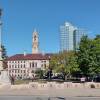At Bob’s Turkey Farm in Lancaster, broad-breasted white birds spend most of their days isolated in a barn behind a storefront. Under the watchful eye of a few, select farmers, the birds strut around and swap gobbles.
The pandemic will make this Thanksgiving unlike any other. Family farms like Bob’s anticipated and prepared for smaller, coronavirus-aware Thanksgiving gatherings. Bob's has reduced the number of large turkeys for sale by roughly 20 percent, said Sue Miner, who took over the family turkey farm from her father. Still, even with smaller gatherings, she said that many families want larger turkeys for leftovers.
Other turkey farms across the country have made major modifications to their operations, CNN recently reported. Farmers say they plan to slaughter turkeys earlier than usual and process more hens due to their naturally small size.
At Bob’s, prior hardships have taught Miner, 63, and her family how to navigate the unfamiliar terrain created by the coronavirus. They’re relying on past lessons and good planning to keep their birds and customers safe as the big day approaches.
The pandemic has forced the farm to restrict the number of people in the storefront to six at one time, said Miner. During the pre-Thanksgiving rush, with thousands expected to purchase turkeys and pre-made side dishes, the farm will employ staggered pick-up times to ensure Bob’s can follow social-distancing and avoid overcrowding.
“We’re hoping not to get swamped,” said Casey MacGregor, 33, Miner’s nephew, who runs the farm’s in-house kitchen.
Most of the year, the farm, which sits off Old Common Road in this small rural town, is almost deserted. But in the three days prior to Thanksgiving, the road turns into a parking lot. During this year’s pre-holiday busy period, police will direct traffic in and out of the farm while five employees with two registers and one computer will work the front end of the operation.
“I’m dreading it,” said Miner.
But this is not the first challenging time Miner and her brother Richard Van Hoof — the farm’s president — have worked through.
In June 2016, a fire broke out and burned down a barn, destroying the expensive equipment inside and killing approximately 7,000 baby turkeys. Miner and Van Hoof’s father, Bob Van Hoof — the farm’s founder — saw part of his American dream turn to ashes.
“It was horrible,” Miner said, recalling that her father recognized the challenges that lay ahead. “He looked at the two of us and said, ‘I don’t blame you if you want to quit.’”
But they had no intention of quitting. They chose to push forward and now run the second-generation farm together.
Because it’s a turkey-breeding farm, Bob’s is required to take measures to prevent other disasters from striking, including bird disease. As a result, the farm is well versed in disease management, a wealth of knowledge that has become unexpectedly valuable these days.
The turkeys are intentionally limited in their interactions with people and other outsiders to protect them from deadly diseases, said Miner.
A single, dirty shoe, for example, could cause an outbreak among the turkeys and bring hatching season to a standstill. So Bob’s employs several disease-protection tools, including sanitizing shoe baths at the farm entrances, said MacGregor.
Miner and Van Hoof live in homes on either side of the farm, and both try to keep watch at all times.
“I consider it a lockdown,” Miner said.
Miner’s parents died in the years following the fire.
“I hate to say it, but thank God,” Miner said of her parents’ passing. “Neither one of them would’ve done well with the COVID situation.”
But with Miner and her brother in charge, Bob’s hopes to be in the turkey business for years to come.
Will Andronico Jr. is a junior at Boston University majoring in journalism and film.




